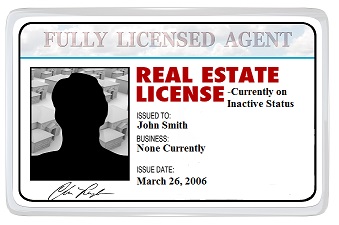Getting Your Real Estate License: Getting into real estate means earning your license and working either for a real estate brokerage firm or hanging out your shingle as an independent contractor.
Any person who engages in real estate transactions as an agent for another must first obtain a real estate license in the state in which they will work. For the general purpose of protecting consumers, each state has its own rules, regulations, and examination for obtaining a real estate license.

Types of Real Estate Licenses
Most states offer two types of real estate licenses: sales (or salesperson) and a broker. In general, real estate salespeople and provisional brokers (or associate brokers in some states) work for and under the umbrella of a designated broker. Some states, such as North Carolina, have a “broker only” licensing system, meaning that there is only one basic type of license (broker) but with various “status levels.”
Many real estate salesperson licensees decide to complete the necessary coursework and exams to become brokers ultimately, as this often provides more flexibility and career opportunities.
If you are considering getting your real estate license, you must review the requirements for your state since there is no such thing as a “national” real estate license. Here, we explain how to find information on your state’s requirements, the different types of real estate classes that are available, and how to prepare for the real estate exam.
State Requirements
Whether you live in California, Florida, New York, Texas, etc., to become licensed, you must meet your state’s unique requirements. You can find this information by visiting the website of your state’s real estate regulatory office. To find the site, you can search for “(your state) real estate regulatory office.” You can also find links to each state’s regulatory agency on the Association of Real Estate License Law Officials (Arello) website.
Each state has specific requirements for:
- Age requirements
- Application process and fees
- Background checks and fingerprinting
- Continuing education
- Education requirements (such as a high school diploma)
- Examination eligibility
- Examinations
- Pre-licensing courses
- Process for achieving the next level of licensing
- Reporting of any criminal history (such as misdemeanor and felony convictions; in most states, if you have a felony conviction or have pled no contest to a felony, you won’t be able to get a real estate license.)
Some states have reciprocal licensing agreements with other states, meaning you can get your license in one state and use it in another without taking that state’s license examination. Nevada, for example, has reciprocity with Arizona, Colorado, Delaware, Idaho, Illinois, Indiana, Iowa, Kentucky, Louisiana, Minnesota, Oklahoma, South Carolina, Texas, Utah, Washington, and West Virginia.
As with regular licensing requirements, each state has its process for obtaining licensure by reciprocity. Qualification requirements can be found on each state’s real estate regulatory agency’s website.
Real Estate Classes
Every state requires you to take some real estate pre-licensing course and demonstrate that you have completed a course with a minimum number of hours before you can schedule to take the real estate license exam. Each class is accompanied by textbooks, workbooks, or online material to assist your studies. It is important to take a course that fulfills your state’s education requirements, considering that there is no “national” real estate course or license.
In most states, there are several ways that you can fulfill the education requirements, including:
- Online pre-licensing courses: All coursework is conducted over the Internet. Search “online real estate classes” to find options; not all online schools offer classes in every state.
- Brick-and-mortar real estate “schools”: In-person classes taught by real estate professionals. Search “(your state) real estate school” to find local schools.
- Community colleges: Many community colleges offer real estate classes that fulfill their state’s pre-licensing requirements. Contact your local community college for information.
You may save money using one type of class program over another; however, it is important to choose the method that will work best for your learning style and schedule. For example, if you are an independent learner, an online class may work well. If you learn better from a live instructor and if you like to be able to ask questions, a brick-and-mortar or community college setting may be more appropriate. Choose your course carefully since the quality of the instructors and materials may directly affect how well prepared you are to take the exam.
In addition to the required pre-licensing classes, there are various real estate exam prep products available to help prepare you to pass the exam. These may be made available to you wherever you decide to take your pre-licensing class, or you can check online (search for “[your state] real estate exam prep”). Many exam preps offer both practice exams and tips for taking the test, both of which can be helpful. Again, since there is no national license, be sure to invest in an exam prep product developed specifically for your state.
License Examinations
Real estate exams are typically conducted on a computer and consist of two parts: a national portion covering real estate principles and practices and a state-specific section that tests your knowledge of your state’s real estate law. Each section is scored separately, and you must receive a passing grade (determined by each state) on both sections to pass the exam. If you fail one part of the exam, you typically need only retake that section. The exams are multiple-choice format; each state determines the number of questions and the time allotted for the exam.
Most, but not all, states use outside testing providers to administer their real estate license exams, with testing offered on weekdays and Saturdays to accommodate different schedules. Once you have completed your pre-licensing course, you should receive instructions on scheduling, registering, and paying for your exam. You can find out more information by visiting the testing provider’s website. A few of the primary providers are:
- Applied Measurement Professionals (AMP)
- Assessment Systems Incorporated (Person VUE)
- Psychological Services Incorporated (PSI)
Whether it is administered by the state or through an outside party, your state’s testing center will have its regulations regarding the testing process, including specific rules for the types of calculators that can be used, and how you identify will be confirmed at the test. It is essential to review the requirements thoroughly, so there are no surprises on test day.
Once your application is approved, the state will mail your real estate license certificate (and probably a pocket card) to the address shown on the application form. Your name will be searchable under the “Licensees” section of its Web site. Keep in mind that it is unlawful to engage in real estate business before the state’s real estate agency issues your license (i.e., don’t start working until you have the license in your hand).
Real Estate License Application
After finishing and passing your exam, you will have half a year to file for your real estate license. When you apply for your license, you will need to fill out the application with your test results, and an application fee, and you may be asked to show your grades from your coursework. In addition, you may be asked to approve a background check before you can get your license.
Your home state’s real estate commission office is where you will submit your application. Make sure to check your state’s requirements for real estate agents. In some states, you may have to join a real estate brokerage company before you can apply and receive your license.
How Long Does It Take to Get a Real Estate License?
If you want to become a real estate agent, it will take you approximately 75 hours of real estate coursework, plus taking the exam, become an agent.5 Some real estate agents report it taking two to five months or more to earn their license.
Is a Real Estate License Expensive?
Getting your real estate license can cost upwards of $1,000, depending on the state. In addition, to paying for your coursework and test, you will owe fees for your license


